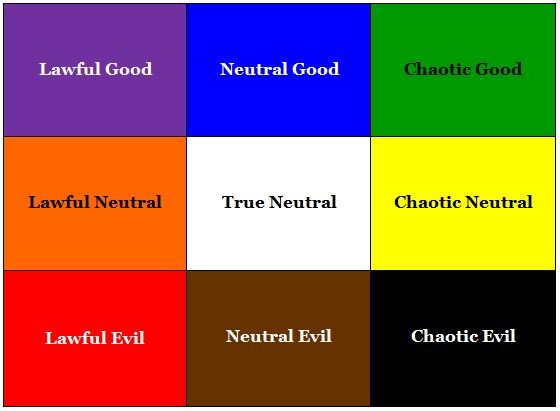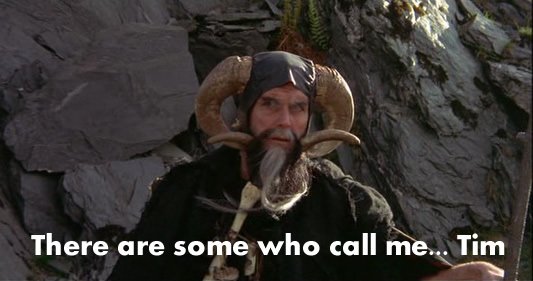The DM's Perspective: Evil PCs in RPGs
Sooner than later, one of your players is going to want to stray from the light and play an evil character. It’s a tricky subject, and I know of several DMs (Dungeon Masters) who flat out refuse to accept these characters, and demand they play a different alignment (see below for explanation). This can lead to player frustration, bitterness, and hurt feelings (see your doctor more for details). So what do you do? You’ve worked hard on creating and/or preparing this adventure and you don’t want it ruined by some jerkhole stabbing all the important NPCs (Non-Player Characters) to death! Well I am here to shed some light on the subject, and hopefully add some of my perspective to this dilemma.
So what’s Alignment? The basic understanding is that alignment is the breakdown of the moral tendencies of your character, how they act accordingly to situations of morality.

Above is a basic alignment diagram, which separates into 5 categories which occasionally overlap: Good, Evil, Neutral, Lawful, Chaotic. These are mostly pretty self explanatory, and we are only really getting into one of these, but it is useful to talk about the different types of Evil. Lawful Evil is a more stable form of evil, and is much easier to work with. You have a standard, a code, or at least a respect for order. This means you can work with party members, even if you don’t agree, out of respect for the functionality of the party. Neutral Evil is less reliable, essentially adapting your affiliation with order when it suits you. Going with the flow, but with evil undertones can add flavor to your character without going on murder sprees. Now the tricky one: Chaotic Evil. Complete disregard for order, and often strives to disrupt the current acting governing bodies, with no real purpose other than to spread chaos: think of the Joker from The Dark Knight. While hard, it is very possible to have a Chaotic Evil character in a party of good players, which I will get more into further below.
Now when we think of evil, what do we usually associate with it? Everyone has their own definition and prerequisites for evil, but we can generally agree on one thing: Murder. Which raises the previous question, how do you deal with murder? Well, if you heed my advice, you won’t have to, and here’s why. Any player or character with two brain cells to rub together will know that murdering innocent people has its consequences. An “evil” character does not necessarily need to fulfill some quota of evil to keep his status, and should understand his limits in the society he/she resides in. Does your character have an insatiable lust for blood? Awesome! Kill those bandits, or those malicious cultists! If you have an inclination for diabolical things, use those on the opponent, which will satisfy your need to murder, and also be beneficial to the party. There is a frustrating assumption that evil characters are incapable of doing good, even for his own benefit.
How about other “evil” acts, like stealing, or arson? How can you accommodate that into your game? Communication with your DM is crucial in all aspects of character creation, but when it comes to playing evil, it’s vital. If your character wants to burn down houses once a week, it’s the DM’s job to find the balance between making the game you want, and making sure your players are having fun. A suggestion: Have him do his crimes in smaller towns in the area, or burn down abandoned houses. These things will have less impact on the overall game but still give him that sense of character fulfillment. Cooperation and communication are necessary if your players insist on playing evil, and if you want your game to remain intact.
Now let’s say you try all this, and your players are not having it. Either they don’t want to commit to going out of their way to do their dark deeds, or they aren’t feeling like they are truly evil; What now? A little perspective might help with situation, along with goal management. Character goals are important to have to help keep the identity and the progression of the character intact. For example, let’s create a quick character named...Tim.

So Tim is a Lawful Evil character who wants to take over the world and rule it with an iron fist. He knows that in his current state he is too weak to accomplish this, and will require training and items. So he finds a party of adventurers, who seek riches and power and tags along, never letting them know of his true intentions. This is his long term goal, and one that will most likely not be realized by the end of the adventure. So what’s the point? The point is that his intention is to dominate the world, to commit a grand evil act. So in comparison to any other acts he may commit, this will be his most diabolical. Doing nuggets of good are completely irrelevant, especially considering he will most likely be destroying those he helped in the future. Now I hear you asking, “But why would an evil character want to save the world? Why would he care?” That’s a pretty simple one if you consider that HE is the one to rule over everyone. He can’t very well take over that which does not exist, or what is under the dominion of some other evil entity. Neutral Evil is in the same vein as Lawful Evil, but let’s talk about Chaotic Evil.
Let’s pretend Tim is now Chaotic Evil. He now just wants to watch the world burn, and delights in the suffering of others. He is truly evil incarnate, and cares nothing for the plights of his common man, why would HE care about the world? Here’s an line from an old character I created a couple years ago (He was Chaotic Evil) when he was asked why he is trying to save the world.
“Because!” He said stomping his foot in frustration, “I’M the one who is supposed to destroy everything! They can’t be allowed to do that, it’s MY job.”
Now obviously your characters may have different motivations and ideals, but this is a decent place to start. It gives motivation for a evil character to work together with a party of good PCs, and gives him a long term goal.
In case you haven’t noticed this yet, I love playing evil characters, and I wanted to take a second to talk about why it’s good to stray away from light every now and again. Firstly, it gives perspective on the moral compass that exists in RPGs. When you only play good characters and are only exposed to first dimensional evil characters, like simple bandits, or stereotypical villains, the sides are pretty black and white. But playing or creating a character/villian with actual goals and expectations that extend beyond the current game, is a very enlightening experience. For example, perhaps rather than having a character who just wants to murder because it’s fun, try this. There’s a man who lost the love of his life, and wants nothing more than to bring her back. He has heard tales of an artifact that can revive her, but he needs to commit murders to satisfy the hunger of the artifact. However, no matter how many he slays, he still can’t get her back. In despair, he wanders the land, killing as he can, desperate to see her one last time. What he is doing is evil, but his intention is good. To paraphrase a good friend and fellow Dm, Quinton Church, “Evil acts with good intentions are three-quarter as evil as Evil with evil intent.”
There is one more thing I need to clear up. There’s a term that exists in the RPG world known as “Murder Hobo”. A murder hobo is a individual or party who hops from town to town killing indiscriminately, usually without any real purpose. These types of characters are the ones to be barred from your games, for several reasons. The acts committed by this group have no drive, and offer no sense of progression to the story or to their own character’s development. More often than not, they just derail a story and don’t give an alternative route either, so it can completely halt your adventure’s progress. The best way to deal with murder hobos is to put your foot down as the DM. We all want to play the game, and while the DM has a different role than everyone else, he is still a player, and a lot of people forget that.
To close off this long winded article, evil played right is a great way to increase the dynamic of your characters, and make great stories. Keeping everyone’s desires in mind when playing evil will prevent any party conflicts and will make interesting character arcs. However, keep in mind that this is merely my perspective, and I encourage everyone to discuss their thoughts down below. Let me know you liked what you saw with an upvote, and let me know what you want to see next!
Thanks and Have Fun Out There!
-Splat